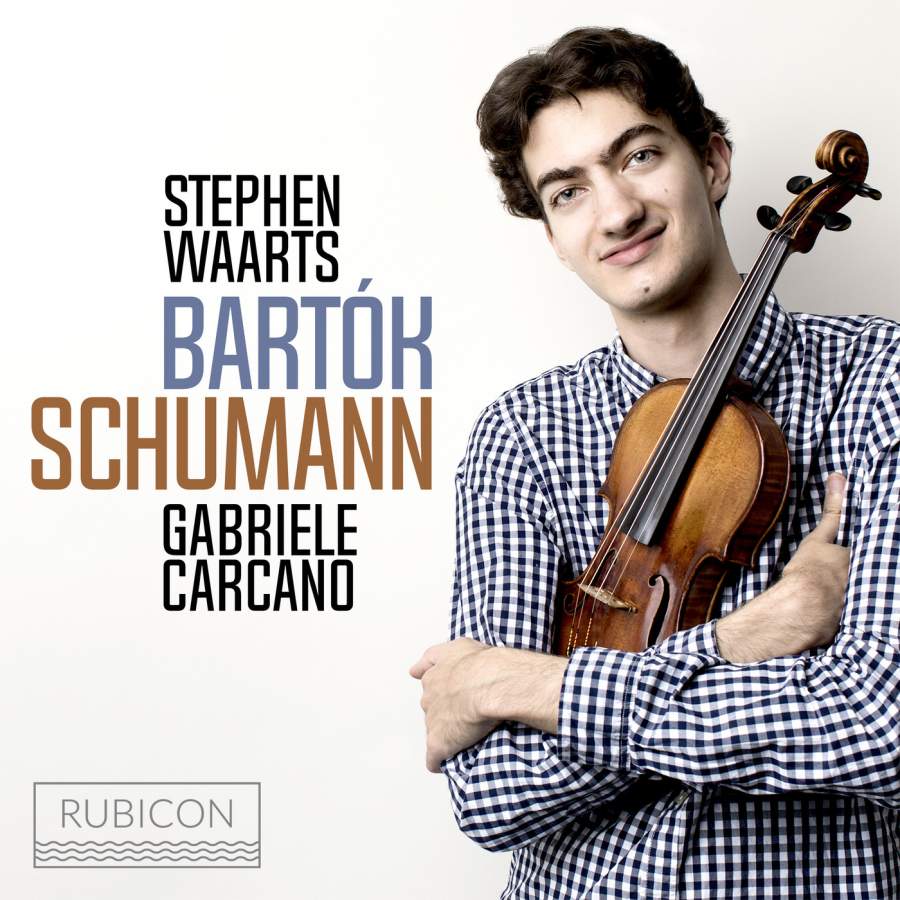Bartok & Schumann

Heartfelt conviction and deep artistic faith inspired Stephen Waarts to choose the programme for his solo debut disc. The 22-year-old Dutch-American violinist, a prize-winning finalist at the 2015 Queen Elisabeth Competition, was determined to record works by his two favourite composers. His new album for Rubicon Classics, made in company with pianist Gabriele Carcano, is scheduled for release in November 2018. It presents the unusual yet compelling coupling of Schumann’s Violin Sonata No.1 in A minor Op.105 and Three Romances Op.94 with Bartók’s Violin Sonata No.1 and Bartók and Joseph Szigeti’s arrangements for violin and piano of Hungarian Folk Tunes.
Critical comparisons with the young Menuhin, appreciative reviews from senior journalists and a recent run of high-profile debut dates underline Stephen Waarts’ rising-star status. The New York Times wrote of his ‘gripping account’ of Bartók’s sonata, commending his ‘technically accomplished and musically insightful’ artistry, while the Washington Post praised his ‘uncommon, preternatural sense of tonal colour and lyrical beauty on the instrument’. The violinist’s new recording represents the latest milestone in the career of one of today’s most eloquent and distinctive emerging talents.
“Schumann and Bartók are two of my favourite composers,” notes Stephen Waarts. “My first instinct was to go with this programme. Rubicon’s director, Matthew Cosgrove, understood just how close these composers are to my heart. I believe they have much more in common than appears at first sight and that their music reveals things about both men when heard in the same programme.”
Waarts’ passion for Bartók took hold during his mid-teens and has since deepened with performances of almost all his works for solo violin. The Hungarian composer, he observes, combines a great sense of logic with earthy folk influences and exquisite lyrical melodies. “Bartók is so rewarding, because there’s always so much to explore. His First Violin Sonata is one of the most complex pieces I’ve ever encountered and is such a challenge, but that leads to so many discoveries with every performance.”
The violinist’s teenage explorations of Bartók’s music coincided with his studies in mathematics and success in nationwide maths competitions in the United States. His Dutch parents are both scientists, with maths playing a large part in his mother’s research, while his siblings are now studying science. “Sometimes that knowledge can be helpful, simply because there are connections between music and mathematics,” notes Waarts. “There’s definitely part of the brain, used for analytical thinking, that’s very useful for performing Bartók. It takes some sort of intelligence to be a classical musician, which is where I find what I learned about mathematics is so useful now.”
Schumann’s violin writing, observes Stephen Waarts, can be even more complex to play than Bartók’s yet it, too, repays generous rewards to the performer. “It gives so much back,” he comments. “That’s the sign of every great composer. There’s something so human about Schumann’s music and what it reveals about the composer’s inner-self. The works I’ve chosen for the album are late pieces – the Three Romances from 1849 and the First Violin Sonata from 1851. The sonata is filled with drama, an inner turmoil that surges strongly in the first movement, always searching for something that remains just beyond reach. I look forward to returning to the piece many times and discovering how my relationship to it changes over the years.”